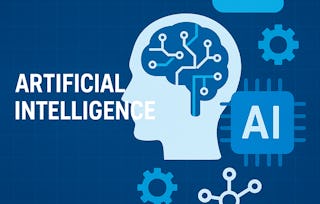Designed as an introduction to the evolving area of AI, this course emphasizes potential business applications and related managerial insights. Artificial Intelligence (AI) is the science behind systems that can program themselves to classify, predict, and offer solutions based on structured and unstructured data.

Artificial Intelligence

Artificial Intelligence
This course is part of Business & Technology Specialization


Instructors: Siva Balasubramanian
7,270 already enrolled
Included with
55 reviews
Skills you'll gain
- Artificial Intelligence
- Market Data
- Applied Machine Learning
- Deep Learning
- Emerging Technologies
- AI Enablement
- AI Product Strategy
- Artificial Intelligence and Machine Learning (AI/ML)
- Business Management
- Responsible AI
- Technology Solutions
- Market Intelligence
- Generative AI
- Supervised Learning
- Human Machine Interfaces
- Machine Learning
- Skills section collapsed. Showing 8 of 16 skills.
Details to know

Add to your LinkedIn profile
33 assignments
See how employees at top companies are mastering in-demand skills

Build your subject-matter expertise
- Learn new concepts from industry experts
- Gain a foundational understanding of a subject or tool
- Develop job-relevant skills with hands-on projects
- Earn a shareable career certificate

There are 9 modules in this course
Welcome to AI in Business! Designed as an introduction to the evolving area of AI, this course emphasizes potential business applications and related managerial insights. Artificial Intelligence (AI) is the science behind systems that can program themselves to classify, predict, and offer solutions based on structured and unstructured data. For millennia, humans have pondered the idea of building intelligent machines. Ever since, AI has had highs and lows, demonstrated successes and unfulfilled potential. Today, AI is empowering people and changing our world. Netflix recommends movies, Amazon recommends popular products, and several EV manufacturers are working to perfect self-driving cars that can navigate safely around other vehicles without human assistance. More recently, Generative AI (e.g., OpenAI’s GPT-4, and variants of this concept such as Google’s Gemini, Anthropic’s Claude or Microsoft’s Copilot) has revolutionized and energized imaginations and expectations with multi-modal capabilities. Businesses are scrambling to suitably adjust AI strategies across multiple domains and industries. This course focuses on how AI systems understand, reason, learn and interact; learn from industry’s experience on several AI use cases. It seeks to help students develop a deeper understanding of machine learning (ML) techniques and the algorithms that power those systems, and propose solutions to real world scenarios leveraging AI methodologies. Students will also learn the estimated size and scope of the AI market, its growth rate, expected contribution to productivity metrics in business operations. In Module 1, in addition to introducing AI, this module familiarizes students with (a) key aspects of AI’s evolutionary history and the related advances in semiconductor computer chips, (b) current global AI market size, expected compounded annual growth rate (CAGR) and market forecasts until 2030 and beyond, and (c) corresponding trends that contributed to AI’s impressive growth potential.
What's included
15 videos5 readings4 assignments1 discussion prompt
In this module, students learn several components embedded within the broad AI domain; they will also understand (a) several types of machine learning (supervised, unsupervised, reinforcement and deep learning); (b) types of Artificial Neural Networks; (c) System1/System 2 thinking, legal issues in AI/ML and problems in aligning machine and human goals in AI/ML applications.
What's included
11 videos4 readings4 assignments
In this module, students will learn about contributions to AI progress from (a) fully-evolved and midstream (and still evolving) technologies; (b) midstream and still-evolving technologies, as well as emergent technologies, and (c) insights from Kurzweil’s Law of Accelerating Returns to learn how the creative integration of multiple technologies over time accelerates AI progress.
What's included
10 videos5 readings4 assignments
The focus of this module is on the abilities of AI that are assessed in the context of what we know about human abilities; students will learn about human-AI collaboration, understand key advantages and disadvantages associated with AI. Additionally, students will be exposed to a variety of AI/ML use cases (or application examples in the business context); this will help increase their familiarity with AI/ML deployment across several industries, and companies within an industry.
What's included
9 videos4 readings4 assignments
In this module, we assess AI’s impact from two opposing perspectives: first, students will learn the very impressive productivity gains expected from AI for the foreseeable future along with the corresponding rise in AI investments/infrastructure and GDP growth; second, predictions of dramatic job losses from AI/ML adoption that unfortunately presents a sobering view. Finally, students will assess the challenges associated with modeling human judgment with machine learning, explore the implications of automation and the AI Chasm.
What's included
11 videos6 readings4 assignments
This module focuses on comparisons and contrasts at multiple levels; for example, at the company level, focusing on company-specific AI strategies may generate insights on successful approaches to leverage the company’s strengths. Similarly, focusing on nations sensitizes students to regional/cultural/political forces shaping the adoption and deployment of AI; an industry specific focus may generate many use cases that students can learn from; and finally, focusing on specific business functions within a company may be an thoughtful exercise to tightly integrate AI deployment within a company across its business functions. The discussion in this module emphasizes many AI use cases.
What's included
11 videos4 readings4 assignments
This module focuses on areas within the AI industry that are growing fast because of their very promising potential for aiding new discoveries and new use cases. Students will learn about the history of Generative AI, market size and growth rate, exciting avenues for potential innovations in Generative AI applications. In addition, students will explore the concept of Explainable AI as a potential tool to overcome inherent limitations underlying AI/ML predictions and recommendations i.e., the lack of explanations or rationales underlying those predictions and recommendations.
What's included
7 videos4 readings4 assignments
Students will understand key elements of two important concepts in AI practice: AI Ethics and Responsible AI. Students will be able to describe the basics of AI Ethics and Anthropomorphism; they will learn about moral/ethical dilemmas or bias issues that may confront AI systems or devices; within the broad realm of Responsible AI, students will develop an understanding of fairness, transparency, accountability and safety concepts. Finally, given the emergent and current regulatory framework for AI at the global level, students will learn about responsible AI practices in the context of managing Data, Privacy and Compliance issues.
What's included
8 videos4 readings4 assignments
This module contains the summative course assessment that has been designed to evaluate your understanding of the course material and assess your ability to apply the knowledge you have acquired throughout the course.
What's included
1 assignment
Earn a career certificate
Add this credential to your LinkedIn profile, resume, or CV. Share it on social media and in your performance review.
Build toward a degree
This course is part of the following degree program(s) offered by Illinois Tech. If you are admitted and enroll, your completed coursework may count toward your degree learning and your progress can transfer with you.¹
Instructors


Offered by
Explore more from Software Development
 Status: Preview
Status: PreviewUniversity of Illinois Urbana-Champaign
 Status: Preview
Status: PreviewO.P. Jindal Global University
 Status: Free Trial
Status: Free Trial Status: Preview
Status: PreviewKorea Advanced Institute of Science and Technology(KAIST)
Why people choose Coursera for their career

Felipe M.

Jennifer J.

Larry W.

Chaitanya A.
Learner reviews
- 5 stars
65.45%
- 4 stars
20%
- 3 stars
5.45%
- 2 stars
1.81%
- 1 star
7.27%
Showing 3 of 55
Reviewed on Aug 9, 2024
Professor provides the cutting-edge learning materials of AI, which help students to understand and be able to leverage AI at their current role, even future career goals.
Reviewed on Jul 29, 2025
very well organised, the concepts were very clear, the coverage of syllabus is very precise and complete.
Reviewed on Mar 12, 2025
Could you specify which project you need a review for? If you’re referring to one of your IoT projects.

Open new doors with Coursera Plus
Unlimited access to 10,000+ world-class courses, hands-on projects, and job-ready certificate programs - all included in your subscription
Advance your career with an online degree
Earn a degree from world-class universities - 100% online
Join over 3,400 global companies that choose Coursera for Business
Upskill your employees to excel in the digital economy
Frequently asked questions
To access the course materials, assignments and to earn a Certificate, you will need to purchase the Certificate experience when you enroll in a course. You can try a Free Trial instead, or apply for Financial Aid. The course may offer 'Full Course, No Certificate' instead. This option lets you see all course materials, submit required assessments, and get a final grade. This also means that you will not be able to purchase a Certificate experience.
When you enroll in the course, you get access to all of the courses in the Specialization, and you earn a certificate when you complete the work. Your electronic Certificate will be added to your Accomplishments page - from there, you can print your Certificate or add it to your LinkedIn profile.
Yes. In select learning programs, you can apply for financial aid or a scholarship if you can’t afford the enrollment fee. If fin aid or scholarship is available for your learning program selection, you’ll find a link to apply on the description page.
More questions
Financial aid available,

